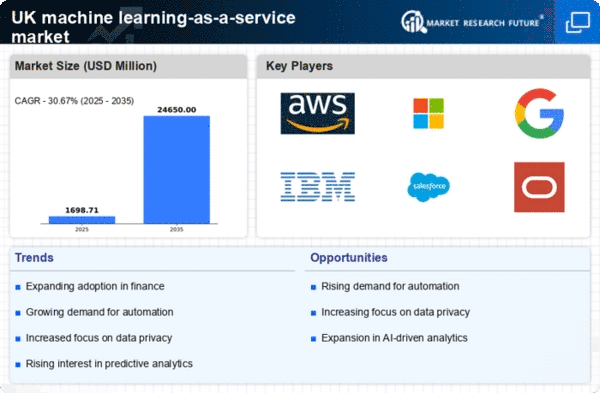Emergence of Advanced Algorithms
The machine learning-as-a-service market is witnessing significant growth due to the emergence of advanced algorithms that enhance predictive analytics capabilities. Innovations in machine learning techniques, such as deep learning and reinforcement learning, are enabling businesses to develop more accurate models for forecasting and decision-making. These advancements are particularly relevant in sectors such as finance, healthcare, and retail, where predictive analytics can lead to improved outcomes and operational efficiencies. The UK market is expected to see an increase in investment in machine learning technologies, with estimates suggesting that spending on AI and machine learning solutions could exceed £10 billion by 2025. This trend indicates a strong inclination towards adopting machine learning-as-a-service offerings that incorporate these cutting-edge algorithms.
Increased Focus on Personalisation
The machine learning-as-a-service market is being driven by an increased focus on personalisation in customer interactions. Businesses in the UK are recognising the importance of tailoring their products and services to meet individual customer preferences, which is facilitated by machine learning technologies. By leveraging customer data, organisations can create personalised experiences that enhance customer satisfaction and loyalty. This trend is particularly evident in sectors such as e-commerce and marketing, where targeted recommendations and personalised content are becoming the norm. As companies strive to differentiate themselves in a competitive landscape, the demand for machine learning-as-a-service solutions that enable personalisation is likely to grow. This shift towards customer-centric strategies is expected to contribute to the overall expansion of the market.
Rising Adoption of Cloud Computing
The machine learning-as-a-service market is experiencing a notable surge due to the increasing adoption of cloud computing solutions across various sectors in the UK. Businesses are increasingly migrating their operations to the cloud, which facilitates the deployment of machine learning models without the need for extensive on-premises infrastructure. According to recent data, the cloud computing market in the UK is projected to grow at a CAGR of approximately 20% over the next five years. This trend is likely to drive demand for machine learning-as-a-service offerings, as companies seek scalable and flexible solutions to harness the power of data analytics and artificial intelligence. The ability to access advanced machine learning tools via the cloud allows organisations to innovate rapidly and improve operational efficiency, thereby enhancing their competitive edge in the market.
Growing Need for Data-Driven Insights
In the current landscape, the machine learning-as-a-service market is being propelled by the growing need for data-driven insights among businesses in the UK. Companies are increasingly recognising the value of leveraging data analytics to inform strategic decisions and enhance customer experiences. As organisations generate vast amounts of data, the demand for sophisticated analytical tools that can process and interpret this information is on the rise. It is estimated that the data analytics market in the UK will reach £16 billion by 2026, indicating a robust growth trajectory. This increasing reliance on data analytics is likely to fuel the adoption of machine learning-as-a-service solutions, as they provide the necessary infrastructure and algorithms to extract actionable insights from complex datasets.
Regulatory Compliance and Ethical Considerations
The machine learning-as-a-service market is increasingly influenced by regulatory compliance and ethical considerations surrounding data usage. In the UK, businesses are facing heightened scrutiny regarding data privacy and the ethical implications of AI technologies. As regulations such as the General Data Protection Regulation (GDPR) continue to shape the landscape, organisations are compelled to adopt machine learning solutions that adhere to these standards. This compliance not only mitigates legal risks but also fosters trust among consumers. The market for machine learning-as-a-service is likely to benefit from this trend, as companies seek solutions that incorporate robust compliance features and ethical guidelines. The emphasis on responsible AI practices is expected to drive innovation and create opportunities for service providers in the machine learning-as-a-service market.

















